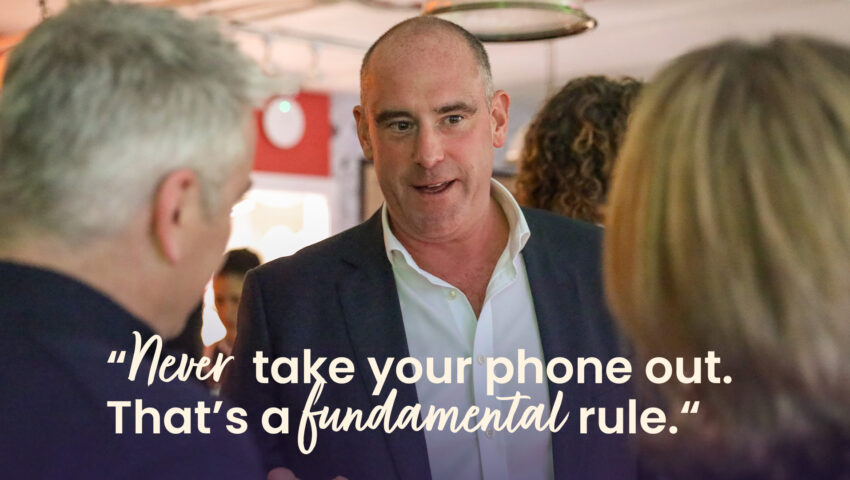Blogs
Never take your phone out: the secret to building relationships

If you walk into a networking event, what’s the first thing you do?
For many of us, the temptation is to head for the coffee stand, pull out our phone, and look busy. But as Angus Brydon, one of BM Caterers’ Managing Directors, points out, that’s the worst way to start.
“Never take your phone out. That’s a fundamental rule. Relationships are built face-to-face, not with your head down scrolling.”
This simple but powerful mindset sets the tone for how Angus approaches relationships with clients, colleagues, and even strangers on a train. It’s also why relationship-building has become one of his greatest strengths.
In a recent episode of the Lunch at Work Podcast, Angus shared his personal experiences and lessons on how to build connections that actually last. Here’s what we learned.
Why building relationships matter more than the product
At the heart of it, catering is about people. Yes, food quality and sourcing matter, but trust and rapport are what clients are really buying.
“It’s nice to work with nice people. If you need to pick up the phone, you want someone who listens.”
Clients often ask to meet the chefs, managers, and operators before committing. Why? Because they want to know if they can trust and enjoy working with the team.
For Angus, the real difference comes from being available, showing genuine interest, and giving clients confidence that problems will be solved, not ignored.
Learning that you’re not everyone’s cup of tea
Early in his BM career, Angus was pulled off an account after the client decided they didn’t “like” him. At the time it was devastating, but it shaped his outlook.
“It wasn’t personal, I just didn’t fit their requirements. That was a strong lesson. You’re not going to be everyone’s cup of tea.”
The key? Don’t dwell. Stay professional, keep listening, and look for personal touches that might sustain a respectful working relationship. Not every connection will turn into a perfect match, and that’s okay.
Why listening beats having all the answers
When the pandemic hit, new rules and challenges emerged daily. Nobody had all the answers. One team member gave Angus advice that stuck:
“It’s okay not to have the answer.”
Now, instead of rushing to fill silence with half-guesses, Angus pauses and does his “homework.” It’s better to provide the right answer tomorrow than the wrong one today.
This applies to both clients and teams. Leaders don’t need to be fixers in every moment—they need to listen. Sometimes, a colleague simply wants to be heard, not given an instant solution.
The 60/20/20 rule for better teamwork
One of Angus’s best-known lessons is the 60/20/20 rule.
-
60% of your work should be the tasks you enjoy and excel at.
-
20% are the “must-dos”—the tasks you’ll get done but don’t love.
-
20% are the tasks that cause stress or anxiety, the ones you avoid.
“Outsourcing your 20% isn’t a weakness. It’s teamwork. No one has 100% of the skills to do everything perfectly.”
For Angus, that 20% is written communication. He’s more effective on the phone, listening and problem-solving, so he relies on his team to support the clerical side. In return, he covers their 20%.
It’s a simple principle: teams thrive when individuals complement each other instead of trying to do it all.
Choosing authenticity over sales
People spot insincerity a mile off. If you’re trying too hard to be someone you’re not, relationships break down quickly.
“At some point, fake stops working.”
Being authentic means showing up as yourself—nerves and all. Clients and colleagues will either click with you or they won’t, but at least the connection will be real.
And when you promise something? Deliver. Nothing destroys trust faster than failing to follow through.
How to bounce back from rejection
Angus is quick to remind us that rejection happens. Not every meeting will go your way. The important thing is to avoid taking it personally.
“Suck it up, dust it off, and get on with it. Don’t linger on rejection. Keep moving forward.”
Resilience is essential in business, and the faster you can reset, the quicker you’ll spot the next opportunity.
How to own a room without your phone
-
Shoulders back.
-
Hand out to the first person you see.
-
Start talking.
Most people are nervous too. By taking the lead, you instantly break the ice and invite others to connect.
The power of chance conversations
Believe it or not, BM has won contracts that started with chance conversations on a train. Angus chats openly with people he meets in everyday life. It’s not about pushing a business card—it’s about being genuinely interested in others.
These casual interactions can lead to unexpected opportunities. Authenticity travels well, even between train stations.
Why team culture depends on inclusivity
Building relationships isn’t just external. Internal dynamics matter too. Cliques or exclusive groups can create division and harm culture. Angus believes leaders must challenge this directly, but privately.
Conflicts should be handled one-to-one, respectfully, and with a focus on solutions. Gossip and public criticism damage trust across the whole team.
Staying humble and adapting your energy
Angus admits he can be “a lot” in meetings. Not everyone warms to his energy right away. The key is adapting to the room without changing who you are. Sometimes you enter gently, other times with confidence.
And when things go wrong? Own it. One BM chef famously tripped, dropped a tray, and created a moment of chaos during a client meeting. The team pulled together, everyone laughed, and the client chose them. Why? Because they saw authenticity and teamwork in action.
Key takeaways
-
Be present: Put your phone away and engage with people around you.
-
Be genuine: Authenticity builds trust; fake doesn’t last.
-
Follow through: Deliver on promises, however small.
-
Listen first: You don’t need all the answers in the moment.
-
Share the load: Use the 60/20/20 rule to complement your team.
-
Bounce back: Don’t linger on rejection—move forward.
-
Stay humble: Adjust your approach to suit the people in the room.
Final word
Business isn’t just about products or services—it’s about people. Clients don’t just buy food, they buy relationships, trust, and confidence in the team they’ll be working with.
So next time you walk into a networking event, remember Angus Brydon’s golden rule: put your phone away, look someone in the eye, and say hello. The relationship that follows could change everything.
About the podcast
This blog is based on an episode of the Lunch at Work Podcast, where we talk to experts about how to make workplaces better. To hear the full conversation with Angus Brydon and discover more insights into building lasting business relationships, listen to the episode here.





